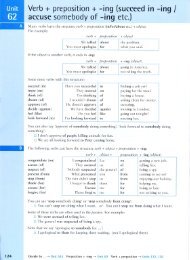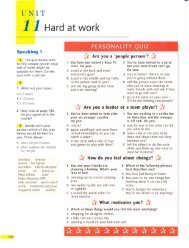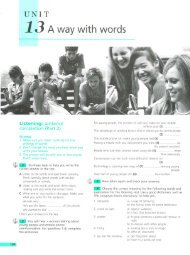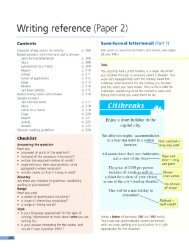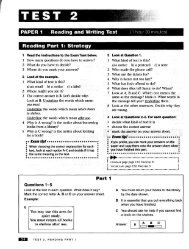Create successful ePaper yourself
Turn your PDF publications into a flip-book with our unique Google optimized e-Paper software.
T]<strong>NIT</strong><br />
<strong>13</strong> <strong>Natural</strong> <strong>wonders</strong><br />
Reading 1: multiple matching (part 3)<br />
1 Look at the photos. These animals all have something in<br />
common. What do you think it is?<br />
2 Read the title and subheading of the text opposite and<br />
scan each section quickly to check your answer to Exercise 1.<br />
ip.<br />
J,$p<br />
3 For questions 1-15, choose from the sections A-E. The<br />
sections may be chosen more than once. When more than one<br />
answer is required, these may be given in any order.<br />
Which section of the article mentions<br />
a person who gained a skill at an early age?<br />
someone who behaved in a way that was not typical of<br />
them?<br />
a person who got a pet by chance?<br />
a creature that started to behave in a drsturbed<br />
manner?<br />
a person who was very upset about leaving their pet?<br />
a statement which was not believed by another person?<br />
a creature that was able to predict an event<br />
happening at irregular intervals?<br />
a pet that got angry when its owner went out?<br />
a situation that could have been more serious than it was?<br />
someone who recognised a sound made by their pet?<br />
a pet that appeared to be jealous?<br />
a creature that predicted a change in a routine?<br />
a creature that only reacted in a particular way<br />
when its owner was involved?<br />
4 Compare your answers with<br />
a partner and explain your choices.<br />
What parallel phrases did you find<br />
in the paragraphs to help you?<br />
tI-fl<br />
t2T_l<br />
t3T_-]<br />
ET_ltrT_-]<br />
t6T-t<br />
E-t_-l<br />
tET-'lrc-n<br />
RTT_I<br />
tiT__-]<br />
tizT__-]<br />
tr3T__l<br />
RAT--I<br />
tisT__-]<br />
154
15<br />
120<br />
The unexplained powers of animals<br />
Do animals have special powers that people have lost? Rupert Sheldrake looks at the evidence.<br />
A<br />
Some pets seem to have an amazing ability to locate their broken glass, with his paws bleeding badly. Frightened by<br />
owners. Twelve-year-old Bobby Chesson came across a the storm, he had run into a glass door. Fortunately, a<br />
racing pigeon in his back yard in West Virginia, USA. He possibly tragic situation was avoided as she was able to get<br />
looked after it, calling it pigeon 167 after the<br />
Eric to the vet in time to deal with his injuries.<br />
identification number on its leg-ring, and it became his<br />
pet. Then Bobby was taken to hospital for an operation.<br />
E<br />
One dark, snowy night about a week after his admission, Occasionally, a pet's attachment to one particular owner<br />
the boy heard a fluttering at the window of his hospital can show itself in strange ways. Celia and David Watson,<br />
room. He asked his nurse to open the window, telling her who live in Sussex, England, used to have a parrot called<br />
that his pigeon was outside. Just to humour him, she did Oscar. 'I couldn't go near Oscar when David was in the<br />
so - and in flew pigeon 167, having flown over 100 miles room - he seemed to resent me taking David's attention,'<br />
to find him.<br />
B<br />
Unusual powers are not confined to pet birds but are seen<br />
in other animals which have a close bond with their<br />
owner. Herminia Denot grew up on a ranch in Argentina,<br />
and learned to ride almost before she could walk. She was<br />
very attached to her horse Pampero, but the time came<br />
when she had to go away to boarding school in the<br />
capital, Buenos Aires and, much to her dismay, Pampero<br />
could not accompany her. The gaucho (cowboy) who<br />
looked after the horse said that at the end of each term, as<br />
the time of Herminia's return grew near, 'Pampero would<br />
go crazy. He used to gallop around the field neighing.'<br />
When she was due to arrive, the horse would stand by the<br />
gate, looking south towards the train station. But on one<br />
occasion, Pampero stood looking in the opposite direction.<br />
And this time Herminia arrived by road - from the north.<br />
c<br />
Anticipatory behaviour is common in various creatures.<br />
David Waite worked from his home in Oxford, but his job<br />
as a public relations consultant also involved lengthy trips<br />
abroad. In his absence, David's parents used to stay in the<br />
house to deal with telephone calls from his clients and to<br />
feed Godzilla, his cat. David used to ring home frequently<br />
to check that all was well and get any messages.<br />
'Whenever I called,' says David, 'Godzilla would run and<br />
sit beside the telephone as it started to ring. My calls were<br />
made at many different times of day - they weren't<br />
regular. And she totally ignored all the other calls. The<br />
only explanation I can think of is that it was some kind of<br />
telepathy.'<br />
D<br />
Sometimes telepathic communication can work from pet<br />
to owner. Dolores Katz, from New Mexico, tells the story<br />
of a time when her dog, Eric, seemed to communicate<br />
with her telepathically. 'One day while I was at work it<br />
started to thunder and rain. As I worked, I got more and<br />
more agitated. Somehow I knew that Eric needed me. At<br />
last I couldn't take it any more. I hardly ever take time<br />
off, but this time I dropped everything and rushed home.'<br />
Dolores found Eric lying in the back room surrounded by<br />
says Celia, 'The bird would just try to attack me without<br />
warning. I couldn't give him his food or even touch his<br />
cage. And when David left the room, Oscar would fling<br />
himself against the side of the cage in fury.' The panot was<br />
quite calm when David was away at work, but started to get<br />
excited ten to twenty minutes before David arrived home.<br />
'Oscar used to run around in his cage making little noises<br />
and fluttering his wings,' says Celia. 'He always knew<br />
when David was going to arrive.'<br />
5 Find words or phrases in the text that mean<br />
the same as:<br />
1 keep someone happy by agreeing to their wishes<br />
(section A)<br />
2 very fond of (section B)<br />
3 one time (section B)<br />
4 when he was away (section C)<br />
5 everything was OK (section C)<br />
6 took no notice of (section C)<br />
7 couldn't accept the situation (section D)<br />
8 have a break from work (section D)<br />
9 sometimes (section E)<br />
6 Rewrite the following sentences, using a<br />
phrasal verb formed with the verbs in brackets.<br />
Then check your answers in the text.<br />
1 Bobby took care of the pigeon. (/ook)<br />
2 Herminia was brought up on a f arm. (grow)<br />
3 David s parents used to take care of his phone calls.<br />
(dea0<br />
4 Dolores' dog had hit a glass door. (run)<br />
5 The parrot used Io move abouf quickly in its cage.<br />
(run)<br />
7 Do you know any similar stories about<br />
animals that have shown unexplained powers?<br />
Can you think of any scientific explanation for<br />
any of these stories?<br />
155
t'\lT f .l <strong>Natural</strong> <strong>wonders</strong><br />
Vocabulary 1: animals<br />
1<br />
Complete the spidergram below using words<br />
from the box. You don't need to use all the<br />
words.<br />
bark beak bite cage claw feather<br />
flutter fur gallop hoof jump up kennel<br />
miaow neigh nest paw peck purr<br />
scratch sing stable snarl tail<br />
Speaking 1<br />
1 Can you match the celebrities and their pets?<br />
Check your answers on page 187.<br />
{ Robbie Williams,<br />
singer<br />
Likes: talking,<br />
football, wearing<br />
trainers<br />
{ Leonardo Di Caprio,<br />
actor<br />
Likes: pasta, rap<br />
music, holidays in<br />
Germany<br />
156<br />
2 Now make spidergrams for these animals. Try<br />
to add some extra words for each animal.<br />
CAT HORSE BIRD<br />
2 Match the sentence halves. Then decide<br />
what pet each sentence is describing - a dog, a<br />
cat or a bird.<br />
1 lt wags<br />
2 lt flutters<br />
3 lt sometimes wears<br />
4 lt might scratch you<br />
5 You can take it for<br />
6 lt's often kept in<br />
a) with its claws.<br />
b) a cage.<br />
c) its tail.<br />
d) a collar.<br />
e) its wings.<br />
f) a walk.<br />
3 Try to work out the meaning of the<br />
expressions in italics. Use a dictionary if necessary.<br />
1 lts not far away as the crow flies, but its miles by<br />
road.<br />
2 Mary took the new girl under her wing and made<br />
sure she felt welcome<br />
The whole things a can of worms - as soon as we<br />
solve one problem, something else pops up.<br />
l'd like to get out of the rat race and go and raise<br />
chickens in the country.<br />
Don't worry if he shouts at you. He doesn't mean it<br />
- his bark is worse than his bite.<br />
I didn't want to tell anyone I was leaving, but then<br />
my friend let the cat out of the bag.<br />
Dominic Monaghan,<br />
actor<br />
Likes: surfing,<br />
insects, video games<br />
( Albino snake<br />
Likes: fish,<br />
sunbathing<br />
( Missy, Rottweiler<br />
Likes: chasing her<br />
tail, yoghurt<br />
{ Bearded dragon<br />
Likes: chopped<br />
peaches, live<br />
insects<br />
2 Why do you think celebrities have unusual<br />
pets?
[I<strong>NIT</strong> <strong>13</strong> <strong>Natural</strong> <strong>wonders</strong><br />
IT'S A DOG'S LIFE<br />
Use of English 1:<br />
multiple-choice cloze<br />
(Part 1)<br />
1 Discuss these questions.<br />
1 What are the advantages and<br />
disadvantages of owning a pet<br />
a) for children or b) for old people?<br />
2 What sort of animals do you think<br />
make the best and the worst pets?<br />
3 Have you ever had a pet? Why?A//hy<br />
not?<br />
4 What pet would you choose if you<br />
could have any sort of animal? Why?<br />
2<br />
1 Look at the picture. What do you<br />
think the girl is holding? What do<br />
you think the dog has on his<br />
collar? What is the connection<br />
between the two things?<br />
2 Read the text 'lt's a dog's life' to<br />
see if you were right.<br />
3 Read the text again and decide<br />
which answer (A, B, C or D) best fits<br />
each gap. There is an example at the<br />
beginning (0).<br />
Will it ever be possible for us to know (0) .....4... what our pets are<br />
thinking or feeling? Actually, this day may not be so (1)<br />
away. A Japanese toy-making firm has (2) up with a gadget<br />
that can read a dog's emotions. The company calls their invention<br />
the'Bowlingual'. The device is (3).......... to a special collarwhich<br />
the dog (4) around its neck, and can (5) .......... information<br />
about the dog s feelings electronically to a handset kept by the<br />
dog's owner.<br />
The company (6) .... that the Bowlingual can (7) .......... six<br />
different feelings, including fear, happiness and sadness, by<br />
interpreting the different ways in which the dog barks. But how<br />
does the Bowlingual actually (8)..........? Scientists analysed the<br />
barks they recorded from a number of dogs in various different<br />
situations and identified six general patterns of sound (9).......... to<br />
different feelings. The Bowlingual is programmed with these<br />
patterns and can (10) them to the sound a dog makes and<br />
then translate this into a sentence that can be (11)<br />
understood. Some examples of what dogs apparently say are 'l'm<br />
lonely,' and 'Please play with me a bit more!'<br />
The device is also fitted with a diary that ('12) .. . . the whole of<br />
the dog's day with statements such as 'We've done so many good<br />
things today. What a happy day!'<br />
0<br />
1<br />
2<br />
3<br />
4<br />
5<br />
6<br />
7<br />
8<br />
I<br />
10<br />
11<br />
12<br />
A exactly B really<br />
A much B distant<br />
A come B put<br />
A carried B attached<br />
A fetches B holds<br />
A extend B spread<br />
A pretends B claims<br />
A accept B know<br />
A work B play<br />
A relating B accompanying<br />
A suit B match<br />
A easily B simply<br />
A takes on B gives out<br />
C absolutely D totally<br />
C far<br />
D long<br />
C taken<br />
D made<br />
C communicated D planned<br />
C wears D transfers<br />
C push D send<br />
C persuades D tells<br />
C realise<br />
C find<br />
D go<br />
C concerning D applying<br />
C design D give<br />
C fluently D surely<br />
C puts away<br />
4 Do you think that it is a good idea for companies to<br />
spend time and money developing inventions like the<br />
Bowlingual? Would you buy one? Why?Al/hy not?<br />
D recognise<br />
D sums up<br />
157
158<br />
Listening: sentence completion<br />
(Part 2)<br />
1 Charlotte Uhlenbroek makes wildlife<br />
programmes for television.<br />
1 What qualifications and skills do you think you<br />
need to do a job like this?<br />
2 What dangers or difficulties might you face?<br />
2 You will hear an interview with Charlotte.<br />
First, read through the following sentences and<br />
think about the type of information needed for<br />
each gap.<br />
Charlotte's mother is English and her father is<br />
(1) . ...<br />
Charlotte was brought up in Nepal, where she went<br />
to a good (2) .<br />
school.<br />
ln her first job, Charlotte worked as a<br />
(3) .............. with the BBC.<br />
While in Africa, Charlotte studied for her PhD, which<br />
was on (4) .........<br />
Charlotte says that making a TV programme was like<br />
talking to a (5)<br />
about her subject.<br />
Charlotte likes television work because she doesn't<br />
have to use (6)<br />
language.<br />
Charlottes most frightening experience was being<br />
chased by (7) ......... ... in the jungle.<br />
On one occasion, a young gorilla<br />
(8).............. Charlotte and then a second<br />
gorilla sat on her.<br />
From her research, Charlotte has become more aware<br />
of the way humans use (9)<br />
............ in<br />
communication.<br />
Charlotte says the future of chimpanzees is threatened<br />
because baby chimpanzees are being sold as<br />
(10)<br />
3 Now listen and complete the sentences with<br />
a word or short phrase. Then listen a second time<br />
to check and complete your answers.<br />
4 Would you like to have a job like<br />
Charlotte's? Why?Al/hy not?<br />
5 Work with a partner. You are going to roleplay<br />
an interview with a famous conservationist<br />
called Jane Goodall.<br />
Student A: You are the interviewer. Look at page 187.<br />
Student B: You are Jane Goodall. Look at page 1 89.<br />
Grammar 1i so, such, too, enough,<br />
very<br />
1 Complete the following sentences using a<br />
word or phrase from the box.<br />
enough (x 2) so such such a too very (x 2)<br />
1 Charlotte has travelled much that she feels<br />
at home in most places.<br />
2 She lived with the chimpanzees for .......... long<br />
time that they got used to her.<br />
3 I don't think l'm patient to be a wildlife<br />
photographer.<br />
4 I don't have .......... money to go to Africa.<br />
5 .......... few people have seen a gorilla in the wild.<br />
6 I was having fun at the party that I didn't<br />
want to go home.<br />
7 I think l'll have an early night. l'm feeling<br />
tired.<br />
8 That cats.......... old and fat to catch any birds.<br />
Which sentence has a negative meaning?<br />
1 The gorillas were very friendly.<br />
2 The gorillas were too friendly.<br />
F'- Grammar reference p.205 (20.a)<br />
2 Join the following sentences together using<br />
solsuch ... that or toolenough ... to.<br />
Example:<br />
1 - e) / was so tired that I stayed in bed all day.
tl{IT <strong>13</strong> <strong>Natural</strong> <strong>wonders</strong><br />
1 I was tired.<br />
2 The car is very big.<br />
3 I had a good time on holiday.<br />
4 I don't have much money.<br />
5 The day was hot.<br />
6 I don't have many qualifrcations.<br />
a) I can't pay the bill.<br />
b) I had to stay indoors in the shade.<br />
c) I won't get the job.<br />
d) I didn't want to go home.<br />
e) I stayed in bed all day.<br />
f) lt won't fit in that space.<br />
3 Complete the second sentence so that it<br />
has a similar meaning to the first sentence, using<br />
the word given. Do not change the word given.<br />
Use between two and five words.<br />
1 Paul was too frightened to move. that<br />
Paul was<br />
not move.<br />
2 The wind was so strong that we could not go<br />
outside. such<br />
There was<br />
that we could not<br />
go outside.<br />
3 I couldn't follow the instructions as they were very<br />
complicated. for<br />
The instructions............. to follow.<br />
4 lt was the most interesting programme I have ever<br />
seen. such<br />
1have......... ... interesting programme.<br />
5 Sarah was too ill to finish the course. well<br />
Sarah ......... .. to finish the course.<br />
6 The tickets cost so much money that we couldn't<br />
afford them. lot<br />
The tickets cost ............ that we<br />
couldn't afford them.<br />
4 Complete the following sentences, giving<br />
true information. You can use words from the box.<br />
Example: I'd like an elephant as a pet because they're<br />
so intelligent. But they're not small enough to<br />
live in our apartment.<br />
boring relaxing intelligent pretty<br />
f riendly convenient<br />
1 l'd like/wouldn't like a spider as a pet because ...<br />
2 I like/don't like Sundays because they're...<br />
3 I like/don't like [NAME OF AN ACTOR] because ...<br />
4 I eaVdon't eat a lot of chocolate because ...<br />
Speaking 2i quiz<br />
I<br />
How much do you know about the world<br />
around you? Work in groups to do this quiz.<br />
1 How would our lives be affected if the Moon<br />
suddenly disappeared?<br />
A Changes in the weather would affect birds and<br />
animals.<br />
B The cost of lighting would increase everywhere.<br />
C Gravity would disappear from the planet.<br />
2 Where does the word Earth come from?<br />
A the ancient Greeks<br />
B the ancient Romans<br />
C the Germanic peoples<br />
3 ls it true that lightning never strikes twice in<br />
the same place?<br />
A Yes. B No.<br />
4 How much do barbecues affect the<br />
environment, compared with other ways of<br />
cooking?<br />
A A lot, because they release carbon dioxide.<br />
B A bit, because they create pollution and bad<br />
smells.<br />
C Not much, because the fuel comes from<br />
replaceable resources.<br />
5 When is the world's supply of oil probably<br />
going to run out?<br />
A soon<br />
B after a long time<br />
C never<br />
6 What is the most violent natural phenomenon<br />
to have occurred on Earth?<br />
A a meteor strike<br />
B a hurricane<br />
C a volcanic eruption<br />
7 What is a tsunamil<br />
A an avalanche<br />
B an earthquake<br />
C a giant wave<br />
O 2 Now listen to see if you were right. Which<br />
answer surprised you the most?<br />
159
t'\IT <strong>13</strong> <strong>Natural</strong> <strong>wonders</strong><br />
Reading gapped text (Part 2)<br />
2<br />
3<br />
1 Discuss these questions with a partner.<br />
What is the longest time you've ever been<br />
completely on your own?<br />
Why were you on your own?<br />
How did you feel?<br />
2 You are going to read an article about a<br />
young woman who went to do voluntary work<br />
abroad. The summary below has five mistakes.<br />
Read through the article quickly, and correct the<br />
m ista kes.<br />
Amy went to Belize to do conservation work in<br />
the desert, living with five other people. She was<br />
looking after baby birds. Because of a sudden<br />
hurricane, she was left completely on her own for<br />
three days.<br />
3 Seven sentences have been removed from<br />
the article. Choose from the sentences A-H the<br />
one which best fits each gap (1-7). There is one<br />
extra sentence which you do not need to use.<br />
A<br />
B<br />
c<br />
D<br />
G<br />
H<br />
I watched the windows closely.<br />
The work was exhausting, clearing an area<br />
for the enclosure, then fencing it off with<br />
wire mesh.<br />
During those three terrifying weeks alone,<br />
I'd realised how strong and resilient I could<br />
be.<br />
Robin took them across in a boat and stayed<br />
r,vith them for hours at a time, helping them<br />
to get used to freedom.<br />
As well as having to cope with the<br />
torrential rain and my fears, I was very<br />
lonely.<br />
For all that time I'd been so excited: I'd<br />
never realised how terrifying the jungle<br />
could be.<br />
As soon as I saw it my heart sank.<br />
They needed feeding four times a day,<br />
which meant collecting plants and food for<br />
them as well as preparing milk.<br />
nlone in the jungle<br />
When Amy Craigen, 22, jetted off to work in Belize, she<br />
never imagined she'd spend 2l days alone in the jungle<br />
I was on a voluntary conservation placement in Belize in<br />
central America, taking a year off before starting<br />
university back home in England. Belize was the wildest<br />
and most beautiful place I'd ever seen, and I couldn't<br />
believe that this would be my home for the next six<br />
months.<br />
After a week's training, I was assigned to a new wildlife<br />
sanctuary that was being set up deep in the jungle. There<br />
was only one other person there, a woman called Robin,<br />
and it was several days'journey from the nearest village.<br />
We lived in a small wooden hut that Robin had built<br />
herself. Food was just rice and beans and we got our<br />
water from a well. 1............ . But once it was ready,<br />
our real job could begin.<br />
We were looking after baby Howler monkeys which had<br />
either been injured or rescued from hunters. Each<br />
monkey stayed with us for a few months until they were<br />
ready to be released back into the jungle. 2............ .<br />
When they weren't sleeping or eating, they played games<br />
and clung to me like little children.<br />
After a month, the time came to take the older monkeys<br />
to a special site across the river, where they could be<br />
prepared for release. 3............ . I was left to look after<br />
the two youngest, so tiny they could sit on one of my<br />
hands.<br />
One day, Robin told me she'd be away at the release site<br />
for about twenty-four hours. I told her I'd be fine, but I<br />
felt nervous at the prospect of a night on my own in the<br />
jungle. After Robin left, it started to rain heavily - and<br />
within minutes it was a full-scale tropical storm. By the<br />
evening, the torrential rain had finally slowed down, but<br />
in the silence the cries of the wild animals in the jungle<br />
sounded twice as loud. That night, I lay arvake listening<br />
to the mice and spiders scuttling across the floor.<br />
4............ . They were only covered by mosquito<br />
netting, and I pictured how quickly a jaguar's claws<br />
could rip through them.<br />
When Robin hadn't returned by the next afternoon, I<br />
knew I had to find her. I set out into the jungle and<br />
walked for four kilometres until I came to the river.<br />
5............ . The water was flowing so fast that trees had<br />
been uprooted. There was no way I could cross it. Then<br />
suddenly, I saw Robin waving at me from the other side.<br />
25<br />
40
I']--IT t3 <strong>Natural</strong> <strong>wonders</strong><br />
4 Think of a film you have seen or a book you<br />
have read which is about one of the following<br />
types of natural disaster. Tell a partner about it.<br />
a meteor strike an earthquake<br />
a flood<br />
a volcanic eruption<br />
a tropical storm an avalanche<br />
. Did anyone try to prevent the disaster from<br />
happening?<br />
. What damage did the disaster cause?<br />
r What happened in the end?<br />
Grammar 2, emphasis with what<br />
1 Read these pairs of sentences. Highlight the<br />
emphatic structure in the second sentence of<br />
each pair. Then rewrite the second sentence<br />
without using What.<br />
1 Belize can suffer f rom severe tropical storms,<br />
especially between August and October. What is<br />
most dangerous about these storms is their<br />
u n predictability.<br />
Their .<br />
thing about them.<br />
2 The Tsunami Warning System is an international<br />
organisation with 26 member states. What it does<br />
is collect information about conditions which could<br />
lead to dangerous tsunamrs.<br />
3 Thousands of people go skiing every winter. What<br />
many of them forget is that, in certain weather<br />
conditions. avalanches may occur.<br />
It was once thought that earthquakes occurred<br />
when the gods were angry. ln fact what causes an<br />
earthquake is pressure between rocks on or under<br />
the Earth's surface.<br />
Hurricanes are strong winds which start over the<br />
sea and may move to dry land. causing great<br />
damage. What is unusual about them is the way<br />
they are named: they are given the name of a man<br />
or a woman.<br />
Grammar reference p. 1 96<br />
2 This structure is often used in spoken<br />
E ng lish.<br />
1 Match the statements and responses below.<br />
1 l've had a really busy day!<br />
2 Do you like skiing?<br />
3 I hate rainy days.<br />
4 My brother keeps complaining he's bored!<br />
5 People keep asking me to do things for them!<br />
a) Oh, ldon't mind rain. What lcan't stand is wind.<br />
b) What he should do is take up some sort of sport.<br />
c) What you need is a hot bath!<br />
d) What you have to do is learn to say 'No'!<br />
e) lts OK, but what I really like is snowboarding.<br />
Q Z Listen and check your answers. Underline the<br />
stressed words in the responses. Then practise<br />
reading the dialogues with a partner.<br />
45<br />
55<br />
I was so relieved, but she yelled across the roaring river<br />
that her boat had been washed away. There was no way<br />
she could reach me - and it could be weeks before the<br />
flood subsided.<br />
When I got back to the enclosure, the reality of the<br />
situation hit me. I was completely alone in the jungle. I<br />
felt scared and inexperienced. I knew I'd have enough<br />
food and water - there was a good stock of supplies. But<br />
what if I was bitten by a poisonous snake or spider? I<br />
realised there was nothing I could do about my situation.<br />
but the days and nights passed very slowly. 6...... ... ... .<br />
By my second week I was chatting to the monkeys for<br />
hours on end. just so that I felt I had some company.<br />
Then, exactly three weeks after Robin had left, she<br />
walked back into the enclosure. I held on to her in tears.<br />
I couldn't stop talking. I've never been so happy to see<br />
someone in my life. After that, my last month in the<br />
jungle passed quickly. By the end it felt like home to me,<br />
and I didn't want to leave. Back in England, I felt like a<br />
changed person. 1 ............ . Looking back, it was the<br />
most important time I've ever spent.<br />
From B MAGAZINE<br />
151
tI\..lT 1.1 <strong>Natural</strong> <strong>wonders</strong><br />
3<br />
I Complete the responses below.<br />
1 A:Would you like a CD for your birthday?<br />
B: Well, what l'd really like is ...<br />
2 A: Did you enjoy the film last night?<br />
B. Yes, but what I enjoyed more was ...<br />
3 A: Do you like reading thrillers?<br />
B: I don't mind them, but what I really enjoy<br />
reading is ...<br />
4 A: Would you like to go shopping on Saturday?<br />
B: Well, what l'd rather do is ...<br />
5 A: l'm going to the shop - can I get you some<br />
milk?<br />
B: Thanks, l've got milk. What lreally need is...<br />
2 Now practise the dialogues with a partner.<br />
Vocabulary 2: the natural world<br />
1 Put the words into six groups of three.<br />
breeze<br />
shower<br />
mist<br />
thunder<br />
climate cloud drizzle fog<br />
f rost gale hail lightning<br />
rain snow temperature<br />
weather wind thunderstorm<br />
2 Choose nouns from Exercise 1 that go with<br />
the following sets of adjectives:<br />
t heavy / lighl / torrential / pouring<br />
2 mild / hol / humid / continental ............... .<br />
3 thick / dense / patchy<br />
4 strong /icy /light / high .........<br />
5 loud / severe / violent<br />
6 deep / thick /weI /slushy .........<br />
7 hot /weI lsunny / dry ...... . .. . ..<br />
3 Discuss these questions.<br />
1 What kind of climate does your country have?<br />
2 How many seasons do you have?<br />
3 What is the weather like in each season?<br />
4 What different types of weather have you had in<br />
the last month?<br />
5 What kind of weather do you like or dislike most?<br />
6 What would be your ideal climate?<br />
4<br />
1 Look at the extracts from radio weather<br />
reports. Match the sentence halves and<br />
underline all the expressions that refer to<br />
severe weather conditions.<br />
1 There will be extremely heavy rain<br />
2 The snow is melting rapidly<br />
3 Driving conditions will be dangerous<br />
4 All ferry services have been cancelled<br />
5 The hot, dry weather will continue<br />
6 Hurricane Katrina is advancing over the Atlantic<br />
Ocean<br />
a) towards the coast of Florida with winds of over<br />
1 30 kph.<br />
b) and avalanches could occur.<br />
c) due to very strong winds of up to 90 kph.<br />
d) with danger of flooding in some areas.<br />
e) and many areas are likely to be affected by<br />
drought.<br />
f) due to thick fog and icy roads.<br />
2 Discuss these questions.<br />
1 Does your country experience any of these severe<br />
weather conditions? Which ones?<br />
2 Can you remember any recent examples and their<br />
effects?<br />
5<br />
1 Complete the idiomatic expressions below with<br />
weather words from the exercises above. You<br />
have been given the first letter of each word.<br />
1 I haven't got time to go out - l'm s.......... under<br />
with work.<br />
2 Don't worry - you'll be as right as r.......... after a<br />
good nights sleep!<br />
3 Jenny was in f.......... of tears after breaking up<br />
with her boyfriend.<br />
4 She cheers everyone up with her s.......... smile.<br />
5 l'm really happy at the moment - there isn't a<br />
c.......... on the horizon.<br />
6 There were s.......... of protest at the plan to<br />
build a new road.<br />
2 Highlight the whole of the idiomatic<br />
expression in each sentence above. What does<br />
it mean?<br />
162
t'\IT <strong>13</strong> <strong>Natural</strong> <strong>wonders</strong><br />
Speaking 3: individual long turn<br />
(Part 2)<br />
A .i lrfi<br />
1 Look at the photos, which show people who<br />
are affected by the weather. Make sentences<br />
beginning like this:<br />
o What's happening in this photo is that ...<br />
o What's different about this photo is ...<br />
. What they seem to be doing in this photo is ...<br />
. What I notice about the person/people in this<br />
photo is that ...<br />
. What must be most difficult for these people is ...<br />
r What l'd find difficult in this situation is ..,<br />
2 Work with a partner.<br />
Student A: Compare photos A and B, and say which<br />
type of weather is causing the people the most<br />
difficulty. You should keep talking for about one<br />
minute. Remember to find general areas to compare<br />
and contrast between the two pictures. Think about:<br />
r what has happened/what's going to happen<br />
o the weather conditions<br />
. the problems the people are facing<br />
. how they might be feeling.<br />
s6,<br />
- "*-<br />
Student B: Listen to your partner and stop him/her<br />
after about one minute. Then answer this question<br />
(about 20 seconds):<br />
( What of type of weather causes most problems in<br />
your country?)<br />
3 Now turn to photos C and D on page 183<br />
and change roles.<br />
Student B: The photos both show people checking<br />
the weather. Compare them, and say why each group<br />
of people might be interested in the weather.<br />
Student A: Listen to your partner and time him/her.<br />
After about one minute, stop your partner. Then<br />
answer the question below, giving a short answer only<br />
(about 20 seconds).<br />
( Do many people in your country watch the weather<br />
forecast on TV?)<br />
t,,-i.<br />
.J.<br />
-!i<br />
.tli t<br />
a\<br />
,,;.<br />
ro
['<strong>NIT</strong> <strong>13</strong> <strong>Natural</strong> <strong>wonders</strong><br />
164<br />
Use of English 2:<br />
open cloze (Part 2)<br />
1 Can you answer<br />
these questions? Check<br />
your ideas on page 188.<br />
1 Do waterfalls freeze?<br />
2 Why is it always windy<br />
near skyscrapers?<br />
3 How long will it be before Neil Armstrong s footprints on the<br />
moon disappear?<br />
4 Has a tossed coin ever landed on its edge?<br />
2 Read the title and the text below quickly. What do you<br />
learn about rainbows that you didn't know before?<br />
3 Read the text again and think of the word which best<br />
fits each gap. Use only one word in each gap. There is an<br />
example at the beginning (0).<br />
Somewhere over the rainbow ...<br />
Why are we all fascinated (0) ...W...... rainbows? They are beautiful<br />
to look at - but they are also attractive because (1) ............the old<br />
story that (2) ............is a pot of gold buried at the end of every<br />
one. Of course, no one has yet managed to find this gold -<br />
(3) ............ even reach the end of a rainbow! So (4) ............ can't<br />
you achieve this apparently easy task? First, weather conditions<br />
(5) ............ to be absolutely right for you to see a rainbow at all. On<br />
top of that, you must be looking at the sky at exactly the right angle<br />
in (6) .......... to see the rainbow clearly. But the problems don't<br />
end there. When you move towards the place (7) ............ the<br />
rainbow seems to end, you find that you never actually get any<br />
nearer - and this is due to the (8) that a rainbow doesn't<br />
actually have an end. In reality, any rainbow is actually (9) ............<br />
circle, but you can't see the whole thing from the ground.<br />
You could possibly see (10) from a plane - but only<br />
(11) ............ you happened to be sitting in a window seat - and that<br />
certainly wouldn't help you find the pot of gold that is supposed to<br />
(12) ............ buried there !<br />
4 Do you know any traditional stories or beliefs about<br />
natural events such as rainbows, thunderstorms, lightning<br />
or earthquakes?<br />
Writing: informal letter<br />
(Part 2)<br />
1 Read the task below and<br />
underline key words.<br />
An English friend, Pat, has written to<br />
ask you for some advice. This is part<br />
of the letter you have received.<br />
I've. fina'ily go+ +re c.tatre. to<br />
eo;re io yo.tr eour}tFY. I hop.. to<br />
slay for atovt d ,aot'tl.h, anl I ean<br />
either eo*p. in Fe.Anv4ny or in<br />
Seple-arkn - I'ra ttot gtre vwlr'eA<br />
wovt/ k 6z#-er? I'/ tiRe. +o<br />
sV.n/ aost of .ny *ime ih +te.<br />
eova*r1sile. qhl if possi&le. +o sr;e.<br />
soene. willhfe., espec-ially 6in/s.<br />
Can you give- ae- soele. 4aliee. oa<br />
+le- 6es+ |itze lo eoae ahl whic.h<br />
plaees I shovl/ visi*, ahl tle bst<br />
way of F++iry the.r
uNIr<br />
<strong>13</strong> Review<br />
1 Which is the odd one out? Explain why.<br />
1 miaow bark gallop neigh<br />
2 fur bone feathers skin<br />
3 stable cage can kennel<br />
4 beak paw claw hoof<br />
5 f lutter fly soar purr<br />
6 fear emotion happiness sadness<br />
2 Which natural disaster is being described in<br />
the following sentences?<br />
'1 The ......... in Alaska in 1964 measured 9 on the<br />
Richter scale and caused major damage over a<br />
large region.<br />
2 .........leads to lower crop production or crop<br />
failure, and may be linked to global warming.<br />
3 What destroyed the ancient city of Pompeir was a<br />
4 A ........., or tidal wave, could be caused by a<br />
meteor hitting the Earth.<br />
5 Nearly all ......... that involve people are triggered<br />
by the vrctims themselves, so skiers and<br />
mountaineers should learn how to recognise and<br />
avoid danger.<br />
6 ......... are the most common and widespread of all<br />
natural disasters except fire.<br />
3 Choose the correct alternative to complete<br />
each of these sentences.<br />
1 All the evidence suggests that animals can read /<br />
understand your mind.<br />
2 Twins often have a near / close bond with one<br />
another.<br />
3 When the child was admitfed / accepted to<br />
hospital, she missed her beloved pet.<br />
4 We were relieved to get a phone call telling us that<br />
all / everything was well.<br />
5 My mother very rarely takes / makes time off work.<br />
6 The pilot landed the plane safely and a potentially<br />
fatal / tragic situation was avoided.<br />
4 Rewrite the following sentences using<br />
phrasal verbs and expressions from the box. Make<br />
any changes necessary.<br />
come across keep on run out of make up<br />
take place put out take part in slow down<br />
phone up go on end up pick up<br />
1 I wanted to be a vet, but now l'm working in a<br />
bank.<br />
2 We may find that we have no more oil left if we<br />
don't try to save energy.<br />
3 Tsunamis occur in all the major oceans of the world<br />
4 The wave starts to go slower when it approaches<br />
land.<br />
5 lt can take firefighters days to stop a big forest fire.<br />
6 Have you ever been involved in a demonstration?<br />
7 You should continue going to the gym even if you<br />
didn't enjoy it - it'll help you to keep fit.<br />
8 I called directory enquiries but the telephone<br />
number is ex-directory.<br />
9 I don't know whats happening next door - they're<br />
making an awful noise.<br />
10 When I was tidying up my room, I found an old<br />
storybook l'd had as a child.<br />
1 1 Trade Fairs are a good place to get new ideas.<br />
12 lf you can't do any of the questions, just invent the<br />
answers.<br />
5 Read the text below and think of the word<br />
which best fits each space. Use only one word in<br />
each space. There is an example at the beginning (0).<br />
LIVING WITH LIONS<br />
Mark and Delia Owens have (0) ?.?.?.(.. workingto<br />
save endangered species for many years. They met at<br />
university and married shortly after (1) ............ taken<br />
their degrees. Then they sold all their possessions<br />
(2) ............ bought one-way tickets to Botswana, in<br />
southem Africa. (3) ............ they wanted to do in<br />
Botswana was to study lions in a natural setting, but<br />
they had hardly (4) ............ money.<br />
They set up camp in a remote valley in the Kalahari<br />
desert, over eight hours' drive from the nearest town.<br />
They were (5) ............ poor that they (6) ............ only<br />
buy petrol to drive to town once (7) ............ few<br />
months, and the rest of the time they were completely<br />
on (8) own. It was a rewarding life, but<br />
sometimes dangerous. One night, (9) ............ they<br />
were camping out in the desert, they woke up to find<br />
they were surrounded by nine lions. But they knew<br />
that the lions (10) probably eaten recently, so<br />
they were probably not (11) much danger.<br />
After seven years, Mark and Delia left Botswana to<br />
continue their work elsewhere, but they (12) ............<br />
forgot the lions they had come to know and love.<br />
Go to www.iTests.com or your CD-ROM for interactive exam practice. 165


![T]NIT 13 Natural wonders](https://img.yumpu.com/28966994/1/500x640/tnit-13-natural-wonders.jpg)
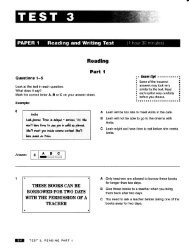
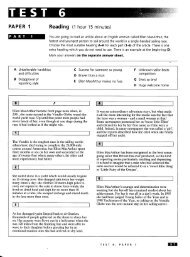
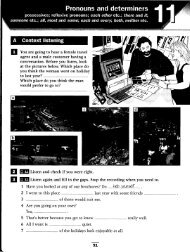
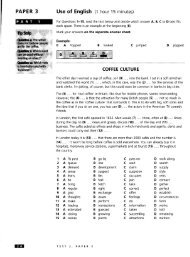
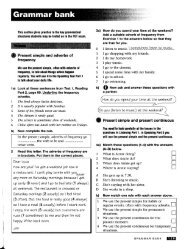
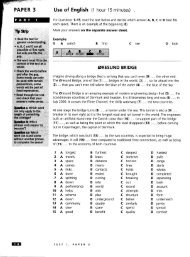
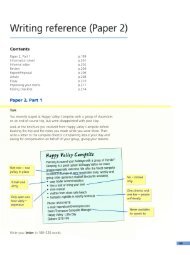

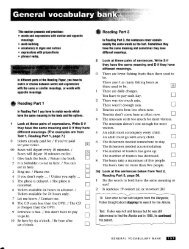
![T]NIT 9 A new look](https://img.yumpu.com/40125756/1/190x248/tnit-9-a-new-look.jpg?quality=85)
